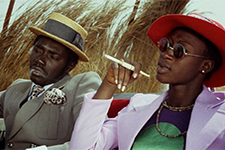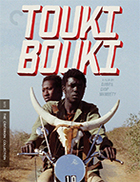Touki Bouki
|  One of the more daring and experimental of films to be produced by a black African in the 1970s, Senegalese writer/director Djibril Diop Mambéty’s Touki Bouki (aka Journey of the Hyenas is an edgy, energetic ode to youthful idealism and rebellion molded quite clearly on the rough-hewn vibrancy of various European New Waves, particularly the works of Jean-Luc Godard. Mambéty, who was only 28 years old at the time and had never directed a feature film (he had made two highly accomplished short films), displays an almost fully formed aesthetic sensibility, mixing highly attuned montage editing and overt visual symbolism with a gritty sense of in-the-moment realism. The film is both a document of its time and place and a poetic evocation of the fervent desire to escape one’s surroundings. The protagonists are a young couple, Mory (Magaye Niang) and Anta (Mareme Niang), who dream of escaping the poverty and squalor of their lives in Senegal and moving to Paris, where they imagine they will forge new and better lives. Anta is a student at the local university, which draws the ire of both her traditionalist family that doesn’t understand her desire for higher education (embodied in her outspoken Aunt Oumy, played by Aminata Fall) and a group of fellow students who see themselves as socialist revolutionaries and begrudge her setting them aside in order to spend time with Mory. Lacking funds to make their dreams a reality, Mory and Anta first plan to steal the earnings of a local wrestling match that have been earmarked to help support a statue of French President Charles De Gaulle, and when that doesn’t turn out as planned, Mory conspires to rip off a wealthy friend in order to put on the charade that he and Anta are already financially successful, which they imagine will smooth their transition into French society. If Touki Bouki has a weakness, it is that Mambéty is too invested in the symbolic value of his characters and situations at the expense of direct empathy and emotional engagement. Neither Mory nor Anta are particularly interesting as characters because they are barely sketched ciphers, representatives of a particular youthful mindset and sense of desperation. Yet, the film is so fiery, so intense, so alive in its provocations that we can easily ignore the lack of traditional emotive registers and engage directly in the larger issues that are clearly on Mambéty’s mind, particularly the tug-of-war between traditional African culture and the vestiges of European colonialism and the frustration felt by young Africans who were caught between the conventions of their elders and the lures of European-style modernity. For his part, Mambéty had clearly bought into the power of modern aesthetics, as Touki Bouki works largely as a Godardian rumination on youth, violence, and broken dreams.
Copyright © 2021 James Kendrick Thoughts? E-mail James Kendrick All images copyright © The Criterion Collection | |||||||||||||||||||||||||||||
Overall Rating: 


 (3.5)
(3.5)


